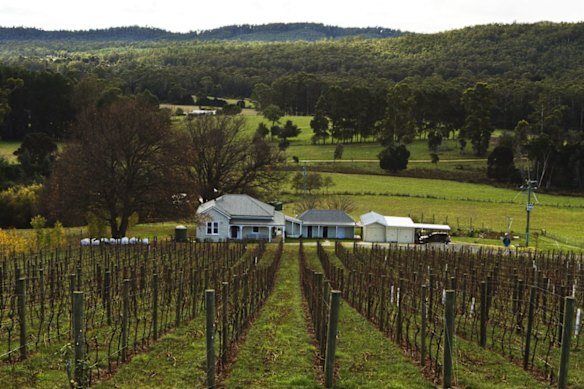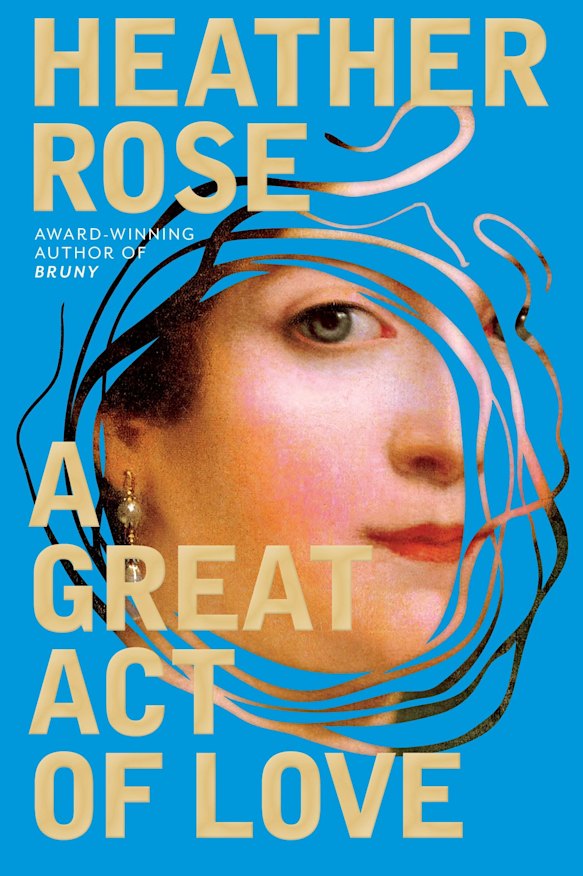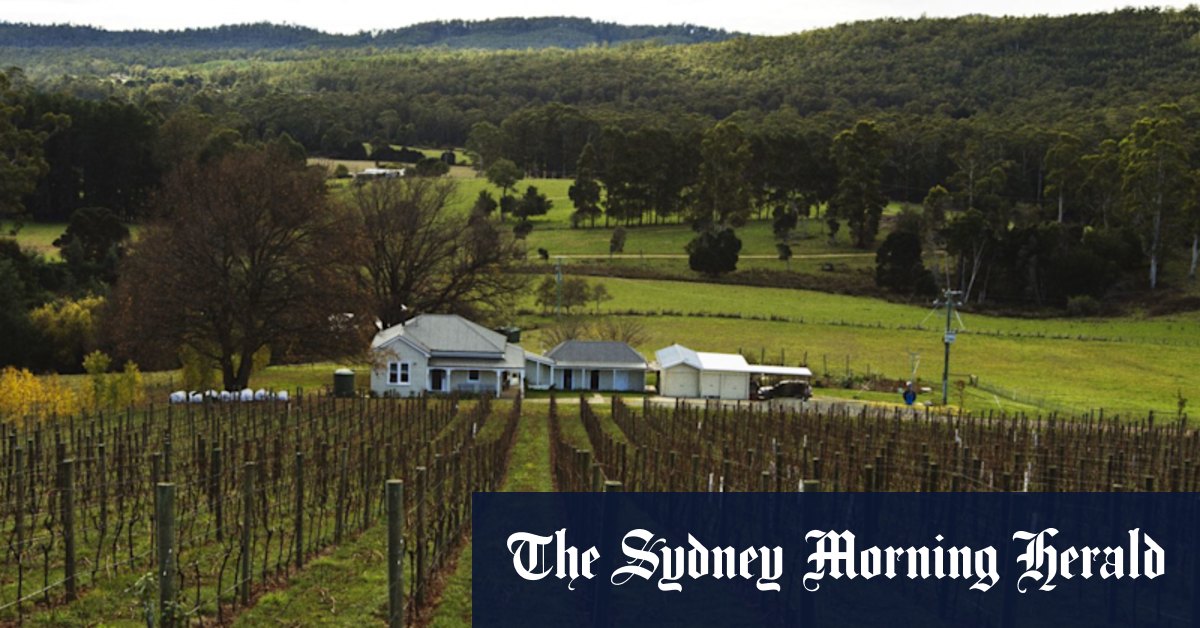Normal text sizeLarger text sizeVery large text size
Dinner parties are always a roll of the dice. You could find yourself seated beside the guest who presses a business card into your hand before the entrée has even landed, or the one determined to recount between courses the entire plot of a television series you’ve already admitted you don’t watch. But Heather Rose got lucky, ending up next to someone who told her a story that lingered long after the tables had been cleared.
“I’d been sat next to a winemaker, and he said that thing you sort of dread as a writer – ‘Oh, I’ve got a really good story you might be interested in’ – because you think, I’ve got enough of my own ideas, please don’t tell me,” Rose recalls with a laugh.
The winemaker in question was Dr Andrew Pirie, a pioneer of Tasmanian viticulture, and the story he shared was an overlooked fragment of local history: a 19th-century vineyard, established by ex-convict Bartholomew Broughton in Hobart around 1823, which produced such exceptional sparkling that, legend has it, one vintage travelled all the way to Paris and took home a medal at the great wine exhibition. The vineyard fell fallow in 1829 after Broughton’s death, but today, more than half of Tasmania’s grapes are grown for sparkling – a lineage that begins with this almost-mythical fizz, the state’s first commercial vineyard.

Tasmania’s Apogee winery, run by Dr Andrew Pirie. Credit: Nic Walker
At the time, Rose was deep into what would become her Stella Prize and NSW Premier’s Literary Awards-winning novel The Museum of Modern Love. But the story of the vineyard began to age in her imagination, like a good vintage. “I sort of said, don’t tell anyone else that story, I’m really, really keen on that,” she says.
Fast forward some 15 years, and Rose raised her own glass of bubbles at the launch in Hobart this week of A Great Act of Love – her tenth novel, and her most ambitious yet.
Onto the fertile ground of the vineyard, Rose overlays another – one rooted in her own family tree. At its centre is Caroline, modelled on Rose’s grandmother’s real great-grandmother, a young woman who arrived in Hobart, then Van Diemen’s Land, searching for her father. Jacques-Louis, an apothecary, had been transported from London to the brutal Norfolk Island penal colony after confessing to the murder of a woman with whom he was having a relationship. Rose believes his life was marked by spells of madness, the result of a frontal-lobe injury. Louis himself was born into turbulence: his parents, Rose believes, were a duke and duchess executed in the French Revolution, their children escaping to Scotland and then to London.
Rose had known the story for some time – her sister, Melinda, had researched the family history and court documents and letters had been uncovered – but for years she resisted writing about it. “I thought, God, I’d never write about that,” she says. “It just felt too awful.”

The novel draws on Heather Rose’s own family history of settlement in Van Diemen’s Land.
But the fragment of wine history opened the door to her family’s own past. “When I realised that Caroline had lived almost beside the vineyard in colonial Van Diemen’s Land, I got this spine-chilling feeling. I thought: I have to wind those stories together somehow.”
What emerged is less a straightforward historical novel than a layering: a palimpsest of Tasmanian history, family lore and myth. The fabled Broughton sparkling becomes entwined with Caroline’s journey and the shadow of her father’s crime. The characters in A Great Act of Love are all wrestling with what it means to inherit a legacy – of shame, of violence, of ambition – and how to transform it. Rose was, too.
There is something very powerful about coming to terms with your ancestral lineage.
“It’s been a long journey to come to terms with that,” Rose says of her ancestor’s violent crime, the legacy that explains why Tasmania is now the place she calls home. “I did feel a real sense of responsibility to the past. There is something very powerful about coming to terms with your ancestral lineage. It felt important to honour the past, to come to terms with the past. It was a painful reckoning.”
The violence perpetrated against the island’s First Peoples is not foregrounded in the novel; their absent presence runs like a gaping wound through a text, a reminder of the enduring brutality of settlement. While A Great Act of Love is, in one sense, an intimate story about a daughter searching for her father, it also expands outward – to the French Revolution, global commerce routes, the slave trade, and the violence of the British Empire.
“I started with a question really. I thought, how the hell did we get here? How did economics become the dominant conversation?” Rose says.
Her reading ranged widely, from Adam Smith and Benjamin Franklin to John Milton and the Brontë sisters and in her studio – no Wi-Fi, only books (more than 160, Rose estimates) – she immersed herself in another century, one that still echoes today.
“It was very peaceful because I could be away from the modern world,” she says. “And the longer I wrote it, the stranger the modern world seemed when I came back up to the house at the end of the day.”
Maggie O’Farrell’s 2022 novel The Marriage Portrait sat on her desk as a reminder of the power of the best historical fiction to make the past pulse with life.
Loading
Across her career – spanning crime, satire, magical realism, and a New York art world novel – Rose has always sought to stretch herself as a storyteller. Now, as her back catalogue is being reissued by Allen & Unwin, Rose admits revisiting her early novels is strange. “You kind of don’t really recognise the person who wrote them. It takes a long time to just become a reader of your own work – and I’d prefer never to have to do it.”
Loading
And yet, despite 10 books and now decades of writing, Rose says the task doesn’t get easier. “It’s very hard to write novels,” Rose says. “In fact, I think it’s possible that it gets harder because I keep setting my bar of what I expect for myself higher.”
Rose is already at work on her next book – something new, perhaps Haruki Murakami-inspired – that will once again test her range. But for now, she is happy to raise a glass of Tasmanian sparkling.
You can bet I did, absolutely,” she says. “And I fully intend to have many more.”
A Great Act of Love is out now via Allen and Unwin. Heather Rose is on tour until October 25. Find dates and locations here.
The Booklist is a weekly newsletter for book lovers from Jason Steger. Get it delivered every Friday.

